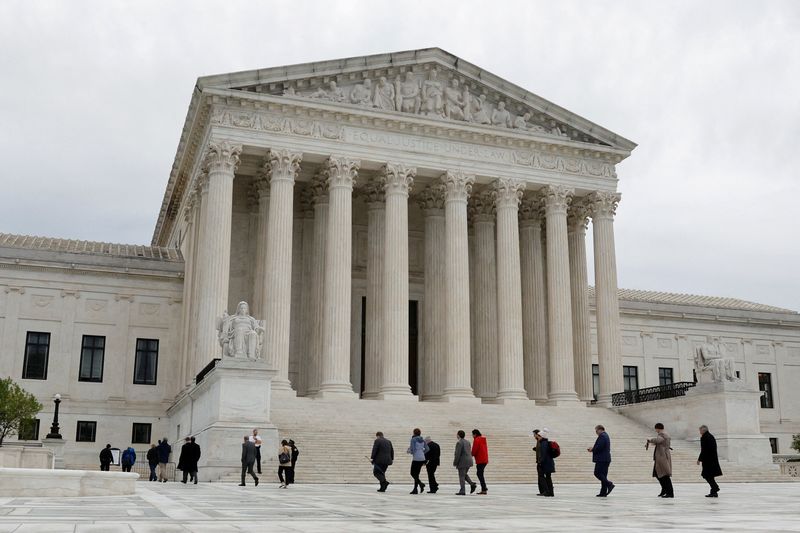By Nate Raymond and Andrew Chung
WASHINGTON (Reuters) - U.S. Supreme Court justices on Tuesday signaled they were unlikely to broadly prevent people who depend on federal assistance programs including Medicaid from suing when states violate their rights even as they weighed barring a narrower class of cases concerning nursing home care.
The justices heard arguments in an appeal by Health and Hospital Corp of Marion County, an Indiana municipal corporation, of a lower court's ruling that let the family of Gorgi Talevski, a nursing home resident diagnosed with dementia, pursue a lawsuit claiming his rights were violated while at the facility.
Public health advocates had raised alarms that the justices could use the case as a vehicle to overturn past precedents and leave tens of millions of people who receive coverage under the Medicaid health insurance program for low-income Americans powerless to sue to prevent states from denying benefits.
But the nine justices focused more narrowly on whether lawsuits filed by nursing home residents were precluded by a law called the Federal Nursing Home Reform Act of 1987 governing those facilities. That law established a "bill of rights" for residents of nursing homes receiving funding under the Medicare and Medicaid government health insurance programs.
Liberal Justice Ketanji Brown Jackson challenged the contention that Congress did not intend to let beneficiaries of federal spending programs bring lawsuits under a separate 19th century law giving people the power to sue when state officials violated their constitutional or statutory rights.
Talevski's family sued under a measure known as Section 1983 that was enacted as part of the Ku Klux Klan Act of 1871, a law passed in the post-Civil War Reconstruction Era to protect the rights of Black Americans.
"Congress created the right in order to allow people to go to court," Jackson said.
But Jackson questioned whether nursing home residents' rights to sue were nonetheless preempted by a provision in the nursing home law laying out "comprehensive administrative processes" that could address their grievances over their care.
"What's wrong with an administrative process if it's comprehensive and works?" conservative Justice Brett Kavanaugh asked.
Talevski was admitted in 2016 to Valparaiso Care and Rehabilitation, a nursing home operated by the Health and Hospital Corp after his family determined his dementia needed professional care. In a 2019 lawsuit, his family said Talevski was subjected to harmful psychotropic drugs and unlawfully transferred to an all-male facility.
Jackson said Congress in enacting the 1871 law intended to ensure that people could go to federal court to vindicate their rights when states did not provide a proper forum to let "people who were terrorized" do so.
The Supreme Court in 1987 and 1990 held that this law could be used by people to enforce rights contained in spending legislation approved by Congress setting conditions for states to receive federal money including Medicaid funds.
But Lawrence Robbins, the lawyer arguing for Health and Hospital Corp, said Congress in adopting the 1871 law could never have envisioned that individuals, rather than the U.S. government itself, could enforce rights contained in a program like Medicaid.
Liberal Justice Sonia Sotomayor asked why the court should assume that Congress wanted to take away a right under that law "as an additional remedy for a violation of a state obligation."
Assistant U.S. Solicitor General Benjamin Snyder, arguing for President Joe Biden's administration, urged the justices to reject a broad limitation on lawsuits pursued under this law.
But Snyder added that the federal nursing home statute provided "extensive" remedies that made a lawsuit unnecessary by exposing nursing homes that violate residents' rights to financial penalties and terminating their Medicaid funding.
Andrew Tutt, a lawyer for Talevski's family, said the 1871 law acts as "a life-saver for people who cannot actually make effective use of the administrative scheme." Tutt said Talevski's family sued only as a last resort after going through an administrative grievance process provided by Indiana that failed to rectify their concerns.

"This family was crying out for help and using every possible lever at its disposal," Tutt added.
A ruling is due by the end of June.